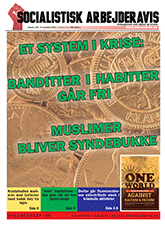Tema: Økonomi
- Økonomi
- Kieran Allen: Review: Thomas Piketty, Capital in the Twenty First Century
Irish Marxist Review (Irland) nr. 10, jun 14 – side 34
Note: How often have you heard the term ‘fantasy economics’ thrown at someone who challenges austerity? Sinn Fein apparently suffers from this ‘weakness’; so does Richard Boyd Barrett from People Before Profit and indeed everyone else who dares to oppose the endless cuts in public spending. There are some variations on the theme: ‘But do your figures add up?’ is probably the most common question any left-winger is asked on the Irish media. ‘Economically illiterate’ is the sniffy put down of those who suggest a tax on wealth.
- Jakob L. Krogh: Er det den private sektor der skaber værdierne?
Socialistisk Arbejderavis nr. 304, dec 10
Note: ”Danmark har relativt set verdens største offentlige sektor og en af de mindste fremstillingssektorer i den vestlige verden. Vi er nødt til at skabe en bedre balance,” siger Niels B. Christiansen, adm. Direktør for Danfoss, i et interview 27. nov. i Jyllands Posten. Dermed giver han udtryk for en udbredt forestilling, som ledende politikere har adopteret fra det private erhvervsliv.
- Jakob Nerup: Finanslov 2010: Kapitalens husholdning
Socialistisk Arbejderavis nr. 293, dec 09 – side 12
Note: Hvert år vedtager det danske Folketing en finanslov. Det er statens budget, som regulerer udgifter for 670 milliarder kroner og indtægter for 576 milliarder kroner. Pengene fordeles efter et større forhandlingscirkus, hvor teatertorden og Dansk Folkepartis rituelle islamofobi fylder det meste. For realiteten er, at kun meget få penge aftales ved selve finanslovforhandlingerne. I år kun 16,5 milliarder kroner, hvilket svarer til 2,5 pct. af finansloven.
- Henrik Herløv Lund: Finanslov 2010: Nyliberalistisk krisepolitik kørt fast
Socialistisk Arbejderavis nr. 293, dec 09 – side 12
Note: Med finansloven for 2010 har regeringen Lars Løkke Rasmussen fået vedtaget sin første egenhændige finanslov. Men, selvom der synes at være et opsving på vej, tyder alt på, at ledigheden fortsat vil være stor og stigende i de kommende år Krisen er med andre ord langt fra ovre og arbejdsløsheden endnu mindre.
- Alex Callinicos: Imperialism and global political economy
International Socialism Journal nr. 108, sep 05 – side 109
- Chris Harman: Booms, slumps and theory (Pavel V Maksakovsky: "The Capitalist Cycle")
International Socialism Journal nr. 107, jun 05 – side 197
Note: A review of Pavel V Maksakovsky, The Capitalist Cycle (Brill, Historical Materialism book series, 2004), Euro 59.
- Jane Hardy: The state of the union (Joseph Stiglitz: "The Roaring Nineties: Seeds of Destruction" + Paul Krugman: "The Great Unravelling: From Boom to Bust in Three Scandalous Years")
International Socialism Journal nr. 102, mar 04 – side 109
Note: Jane Hardy looks at the latest books by Joseph Stiglitz and Paul Krugman.
- Judy Cox: Can capitalism go on forever? (Rosa Luxemburg: "The Accumulation of Capital")
International Socialism Journal nr. 100, sep 03 – side 133
Note: Judy Cox on Rosa Luxemburg's under-appreciated classic 'The Accumulation of Capital'.
- Jane Hardy: Toil and trouble: the nature of the US economy (Robert Brenner: "The Boom and the Bubble: The US in the World Economy")
International Socialism Journal nr. 98, mar 03 – side 125
Note: Robert Brenner’s latest work on the US economy.
- Michael Kidron: Failing growth and rampant costs: two ghosts in the machine of modern capitalism
International Socialism Journal nr. 96, sep 02 – side 87
Note: CAPITALISM'S CAPACITY to waste resources grows as it ages, argues Mike Kidron, as he returns to themes that he first addressed in this journal over 20 years ago. But his arguments have renewed relevance in the age of the global anti-capitalist movement.
- Martin B. Johansen: Marxisme i hverdagen: Statsgælden er deres
Socialistisk Arbejderavis nr. 178, dec 99 – side 7
Note: Indholdet i næste års finanslovforlig er paradoksalt: På den ene side er der overskud, på den anden side skal der igen skæres ned på bl.a. uddannelser.
- Chris Harman: The myth of market socialism
International Socialism Journal nr. 42, mar 89 – side 3
Note: The tide of free market ideas is running as strongly as ever among socialists, both in the West and in Eastern Europe. In 'The myth of market socialism' Chris Harman confronts the work of Alex Nove, one of the foremost theorists of market socialism. His critique of the theory of the market complements Mike Haynes' analysis of three market economies – Yugoslavia, Chile and Hungary – in 'Nightmares of the market', published in our last issue.
Taken together these articles provide a damning analysis of both the theory and practice of modern free marketeers.
- Mike Haynes: Nightmares of the market
International Socialism Journal nr. 41, dec 88 – side 3
Note: From Kinnock to Gorbachev we're told those who support the market hold the key to our future. Yet, West or East, wherever the market has been given its head the cost to working people has been massive.
Mike Haynes shows that in Chile, once the showpiece of monetarism, and in Yugoslavia and Hungary – the great hope of market socialists – society is being ripped apart by market forces.
- Nigel Harris: Deindustrialisation
International Socialism Journal nr. 7, dec 79 – side 72
Note: A spectre is haunting the treasuries of the advanced capitalist countries. It is not yet, regrettably, the spectre of proletarian revolution, but of the obsolescence of capitalism itself, or rather of its great productive engine, industry. In Britain, the trend is known as ‘deindustrialization’.
Der blev fundet 14 artikler
Til hovedgruppe – Til temaoversigt
- Leder: Det mener vi
- Interview: Kampen mod umenneskelige fængslinger af afviste asylansøgere nytter noget
- Udenlandske chauffører har usle vilkår i Danmark
- “Grøn” kapitalisme – kun grøn, når der kan tjenes penge
- Derfor går finansverdenens nålestribede amok i kriminelle aktiviteter
- 1968: Året der forandrede alting
- Mere end en Saudi PR-katastrofe
- To år med Trump har mobiliseret millioner til modstand
- Almindelige menneskers historie: 3. De første store stater og de første klassekampe



 Newsfeed
Newsfeed